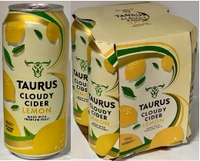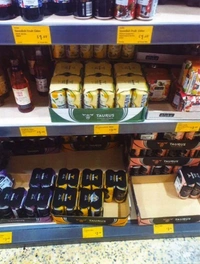Cider house wars: court gives Thatchers lemons
Thatchers’ infringement claim against Aldi in relation to a lookalike cloudy lemon cider has failed.
Background
Thatchers is the owner of UK trade mark no. 3489711 in relation to the below, which reflects the label of its cloudy lemon cider that was launched in early 2020.

In May 2022 Aldi launched its own brand lemon cider under its established Taurus range (the “Aldi Product”). This was sold in packs of four cans, was called cloudy cider lemon, and its packaging consisted of lemons and leaves against a pale yellow background, as shown below.

The claim
Thatchers brought a claim against Aldi in the Intellectual Property Enterprise Court on the basis of sections 10(2)(b) and 10(3) of the Trade Marks Act 1994, as well as passing off.
Aldi denied the claim, although it admitted to having used Thatchers’ product as a benchmark when developing its own. In turn, Thatchers said Aldi’s activities went beyond the norms of market benchmarking, relying on evidence including:
- Aldi’s outside design consultants, the Black Eye Project, considering only Thatchers’ product in their market review;
- Aldi departing from their usual Taurus design, and including additional features including lemons and leaves, with Aldi’s team requesting “a hybrid of Thatchers and Taurus”; and
- concerns expressed by Aston Manor, producer of the Aldi product, that the design was “incredibly close” to the Thatchers’ product.
Thatchers also initially sought to argue that Aldi’s practice of using predominantly oral communication in product development was a deliberate means to avoid any paper trail that would have to be disclosed in the event of litigation. This argument appears to have been abandoned by the end of trial, and the judge accepted the evidence of Aldi’s witnesses that this practice was part of Aldi’s lean and efficient business model.
The sign complained of
A key point of discussion at both the case management conference and trial was precisely what sign it was that Thatchers was complaining about.
At trial, Thatchers’ attempts to explain this took up six pages of transcript. At various points the sign was described as being:
- both the four pack and the individual can of Aldi product as a whole;
- a flat sign placed on the front and rear of an individual can of Aldi product;
- a flat sign on the front of the cardboard packaging of the four pack of Aldi product; and
- the overall appearance of the Aldi product which is the individual can, and that seen on the front face of the individual can of Aldi product.
In the end, the judge reached the conclusion that the sign complained of was a single can of Aldi product.

Section 10(2)(b): Likelihood of confusion
When comparing the mark and the sign, the judge essentially considered the dominant elements of these to be “THATCHERS” and “TAURUS” respectively, and concluded that these were dissimilar. While there was some similarity in the lemon and leaves elements, overall the sign was only similar to the mark to a low degree. Indeed, the judge considered that use of the colour yellow on both cider products and lemon products was ubiquitous, and the use of lemons and leaves on lemon-flavoured beverages was very common.
There was no evidence of any confusion.
In reaching an assessment, the judge gave significant weight to the context of use and the fact that the Aldi product incorporating the sign was placed within a four-pack cardboard sleeve, which may only be perceived from the top down by consumers as seen in the image below.

In light of all of the above the judge concluded that there was no likelihood of confusion between the sign and the mark.
Section 10(3): unfair advantage and/or detriment
The judge was happy the mark enjoyed a reputation in the UK when the Aldi product was launched. Furthermore, evidence of consumer comments about the Aldi product being a “rip-off” and “knock-off” of Thatchers’ product led the judge to conclude that the average consumer would make a link between the sign and the mark.
Unfair advantage
The judge accepted that Aldi had used the Thatchers’ product for the purposes of benchmarking (including for the design of the packaging), however, they considered that the inclusion of the TAURUS mark and the bulls head in the sign sufficiently distinguished the Aldi product. Furthermore, as sales of the Aldi product did not look disproportionate, in relation to sales of other ciders in the TAURUS range sold by Aldi, the judge was not persuaded on unfair advantage.
Detriment
Having carried out a blind taste test the judge accepted that, while similar, Thatchers’ and Aldi’s products possessed different tastes. Thatchers submitted that, given the link made between the mark and the sign, this meant that consumers who buy the Aldi product, and do not like it, will perceive the Thatchers’ product as being affected.
Factoring in the relatively small differences in taste and minor link likely to be made between the sign and mark by consumers the judge was unconvinced by this argument, and did not think the Aldi product would cast Thatchers’ product in a negative light.
Thatchers also claimed that the sign was deceptive to customers, as it stated that the Aldi product was “made from premium fruit” despite containing no real lemon. While agreeing that consumers may distrust Aldi as a result of this the judge found such distrust didn’t spread to Thatchers.
As a result, Thatchers’ 10(3) claim failed.
Passing off
While Thatchers had established goodwill in the mark there was no evidence that any consumers actually considered the Aldi product to be that of Thatchers, for example, manufactured or licensed or approved by Thatchers. As such there was no misrepresentation, and the passing-off claim failed on this ground.
In short
This case is the latest in a line of decisions involving lookalike products which highlight the difficulties faced by brand holders in taking action against such products in the UK (where there is no law of unfair competition).
Ultimately, the key to success in such cases is likely to be filing for the best and strongest trade marks (or designs) as possible in the first place.
Case details at a glance
Jurisdiction: England & Wales
Decision level: High Court
Parties: Thatchers Cider Company Limited v Aldi Stores Limited
Citation: [2024] EWHC 88 (IPEC)
Date: 24 January 2024
